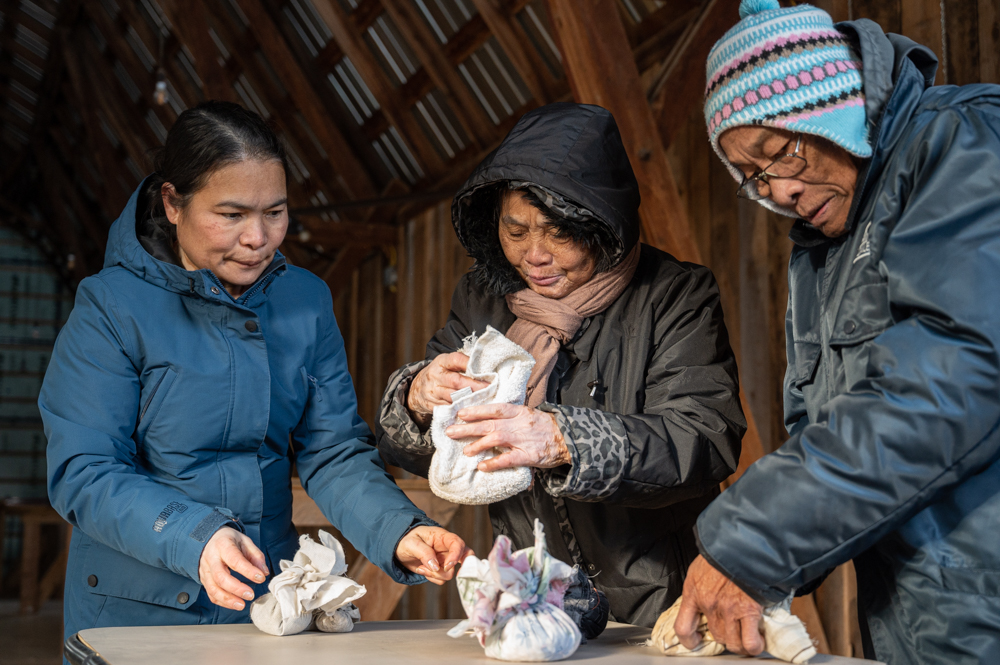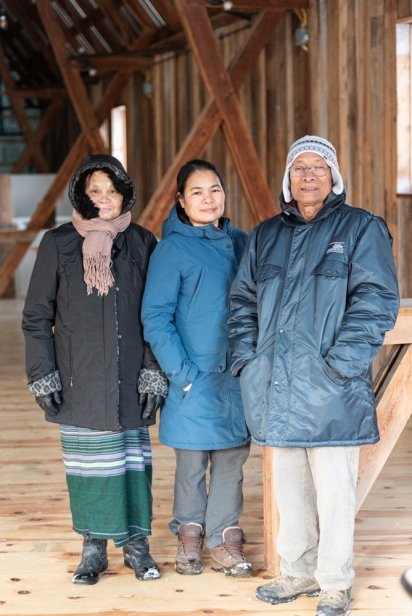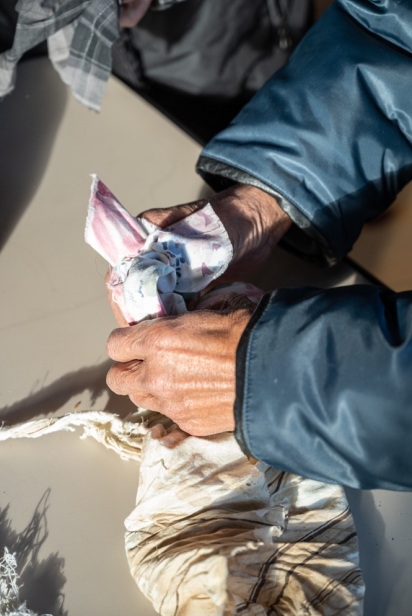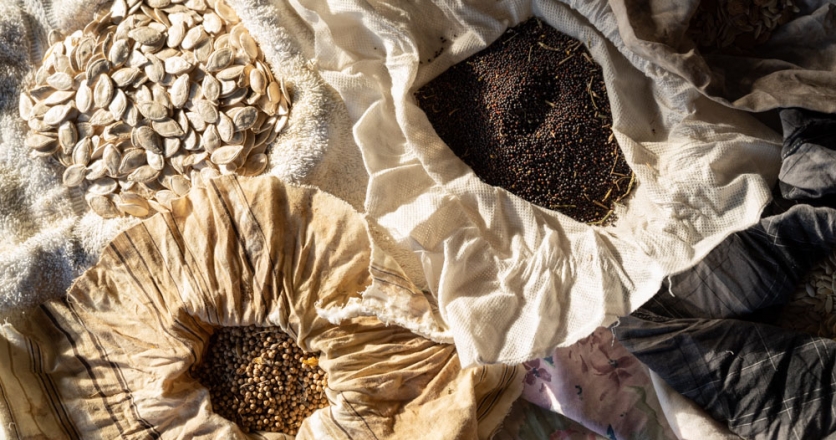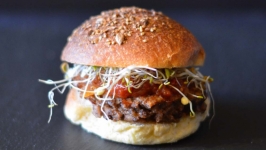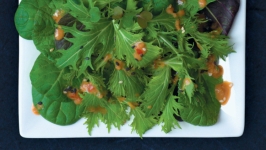Back to Earth
The importance of land cannot be overstated for the Karen people. For generations, farming and a deep connection to the earth is what has sustained a community displaced by civil war in Myanmar to the refugee camps of Northern Thailand. The Karen people are farmers from their hearts to their hands.
In 2004, 400 members of the Karen community re-settled in Ottawa. From the tropical rice-growing regions of eastern Burma and northwestern Thailand, they arrived to urban living in an icy northern climate. Many of the elder members of this community were illiterate, which made their integration into Canadian cultural life that much more difficult. Back home, their livelihoods had revolved around farming, with no access to formal education.
And so they found themselves grappling with almost complete isolation. Unable to communicate outside of their community, many elder members struggled to gain a foothold here, trapped inside during the winter months and suffering in a hot, concrete urban environment during the summer.
However, in 2012 members of the KLEO (Karen Learning and Education Opportunities) support group, an organization that helps the Karen people in Ottawa, saw an opportunity to address this imbalance. With the founding of the Just Food Farm on land formerly used as a tree nursery by the National Capital Commission, an urban agricultural hub was born just to the east of the city in Blackburn Hamlet. On one acre of this land, the Karen Farm grows hundreds of pounds of vegetables annually. And just as important, it produces smiles and laughter and fosters community and cultural education.
“This land keeps the community and its traditions alive,” says Erin O’Manique, a KLEO support group board member. “It combines both learners and teachers, it engages the youth community and solidifies the leadership position of elders.”
As it is with new technology, younger generations adapt more quickly, incorporating cultural changes into their lives with an ease that escapes their elders. This, in its way, turns traditional models of community knowledge and hierarchy on their heads. So while the youth and children of the newly re-settled Karen adapted to life in Ottawa, their elders saw their position in the community diminished.
Then the farm came along and gave them back their lives. First, it allowed them to share their profound knowledge of farming and their ability to feed extended families, hitherto unused in their Ottawa environment, re-establishing their value as contributing community members. Next, it offered a point of cultural connection with young people to encourage them to maintain their mother tongue and understand their cultural roots. It also offered fresh air and exercise to keep them healthy.
Kheela Naw arrived with her three children in Ottawa in July 2007. Her parents followed in May 2012. While Kheela’s accented English is now fluent, which has allowed her to join the workforce in the city, her heart remains on the farm.
“The farm is very important to me, and to my parents, even more so,” she explains. “For my father, who was a rice farmer back home, it is everything.”
As Naw translates for her parents, her father Mowry Dee agrees: “Yes, it’s so important for us to be able to grow our own vegetables and eat healthily, free from chemicals,” he says. For his wife, Yi Kwa, “it’s about getting my hands dirty. Feeling my hands in the soil, getting exercise and fresh air, being outside after a winter inside.”
Naw’s parents are in their late 70s — wiry, strong and fit. They work long days, every day of the season, on the farm. There’s a small shelter on site where they rest during the hottest hours of the day and eat their lunch.
Naw describes the scent of knee-high coriander drifting on the breeze as she approaches the farm, and the taste of Karen cucumbers that has friends and neighbours asking for them. “I used to work with seniors,” she remembers. “There was a woman from Holland and once she tried the cucumbers, she called immediately to ask for more. They reminded her of her childhood,” she recalls.
Naw’s three adult children like to be on the farm to offer a helping hand. They form part of three extended families who farm this land, and who are aged from about four to nearly 80 years old. Among these farming families, there are between 10 and 12 people who work occasionally on the land, as well as a clutch of nieces and nephews, but the bulk of the work is done by the three most senior couples.
They produce long beans, roselle (a species of Hibiscus), daikon radish, bitter melon, squash flowers, coriander, Thai basil, amaranth, various mustards and okra among other Asian vegetables, many of which they use in the soups common to their diet. This produce substantially supports the diets of about 33 people, and possibly more members of these extended families. They also work on a “customer plot,” a small amount of land set aside to grow extra produce to raise money for KLEO to support the farm. In the past they have raised funds through CSA baskets and at farmers' markets. For the last two years, the KLEO produce has been for sale at the Just Food Farm Stand. They also sell to the Gloucester Emergency Food Cupboard (GEFC), which received a grant from the Mazon Foundation to purchase food from a refugee farm. The GEFC feeds about 1,800 people a month and appreciates the fresh produce.
“The farm supports their diet for nearly 10 months of the year,” O’Manique explains. “They preserve and ferment much of what they grow, as well as being accomplished seed-savers. They also forage for wild foods.”
While it has taken time for these farmers to learn to adapt to the Canadian growing season and the challenges of a northern climate, they have done so very successfully, extending the growing season to the margins of spring and fall. This makes Naw dream of becoming a full-time farmer.
“I really want to be a farmer,” she says with a shrug of her shoulders to indicate the near impossibility of it, “since it’s so important to me, to my children, nephews and nieces, so that they will understand our tradition and our culture. It shows us where we came from and what we used to do.”
KLEO Karen Support Group
2009-465 Richmond Rd., Ottawa, Ont.
kloekarensupportgroup.org/karen-farm/


